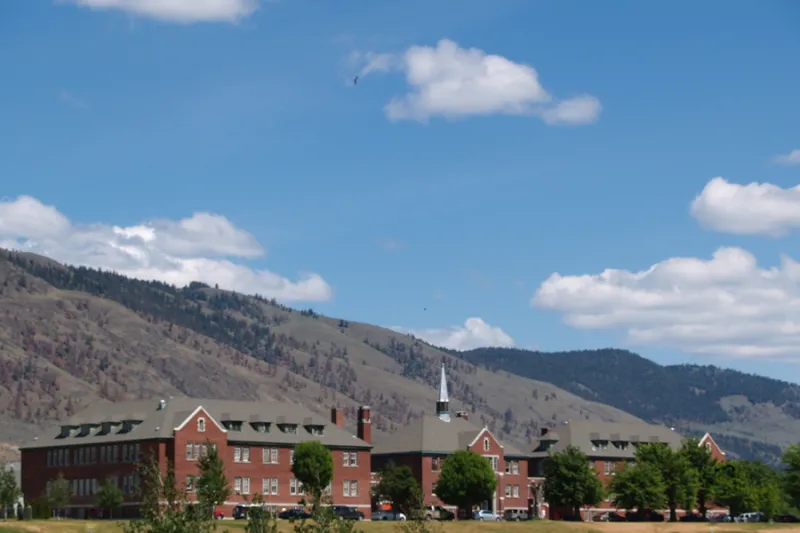
Washington D.C., Jun 11, 2021 / 11:01 am (CNA).
A group of Canadian Indigenous leaders are planning a trip to the Vatican this fall to request a formal papal apology for past abuses at Catholic-run residential schools.
Leaders of the Assembly of First Nations and the Métis National Council are planning the visit, alongside the Canadian Conference of Catholic Bishops (CCCB). In Canada, Indigenous populations that historically populated the region south of the Arctic are referred to as “First Nations.” The “Métis” communities share both Indigenous and European heritage.
Both National Chief Perry Bellegarde of the Assembly of First Nations and Vice-President David Chartrand of the Métis National Council told CBC News that the aim of the visit is to promote the healing process; the visit would come months after the remains of 215 Indigenous children were discovered at the site of a former Catholic-run residential school in Kamloops, British Columbia.
An apology would be “a very big part of healing,” Bellegarde said to CBC News. “Our missing children have not received the same dignity nor respect in death or in life that every human being deserves.”
Canada’s residential school system operated from the 1870s until the last school closed in 1996. First Nations, Inuit, and Métis children were separated from their families and sent to the schools, established by the federal government and run by Catholics and members of Protestant denominations, to force assimilation and strip them of familial and cultural ties.
The Catholic Church, or Catholic religious orders, ran more than two-thirds of these schools.
According to the commission, an estimated 4,100 to 6,000 students died as a result of neglect or abuse in the schools. That figure does not include the recently-discovered graves of 215 children at the site of the former Kamloops Indian Residential School.
Individual bishops, religious orders, as well as the CCCB, have issued apologies for the role the Church played in operating the schools. The Canadian government, as well as other Christian churches, have similarly apologized.
In addition to the apology, the Indigenous leaders plan to ask Pope Francis for the release of all records that relate to the residential schools, and for the return of any Indigenous items from Canada that the Vatican may possess in its archives.
On June 6, during his Sunday Angelus address, Pope Francis referenced the recent discovery in Kamloops but did not formally apologize.
“May Canada’s political and religious authorities continue to work together with determination to shed light on this sad event and humbly commit themselves to a path of reconciliation and healing,” he said.
In 2017, Canadian Prime Minister Justin Trudeau met with Pope Francis at the Vatican and requested a formal apology.
In 2018, Bishop Lionel Gendron of Saint-Jean-Longueuil – the president of the Canadian bishops’ conference at the time – said that although “the Holy Father is aware of the findings of the Truth and Reconciliation Commission,” he “felt he could not personally respond” to the commission’s request for a formal apology.
Last week, Trudeau said he was “deeply disappointed” at the lack of a formal Church apology.
In response, the retired bishop of Calgary pointed out apologies by Canadian bishops. Cardinal Thomas Collins of Toronto also has said that a formal papal apology would require a papal visit to Canada, and added that Pope Francis has already encouraged individual bishops to lead on the reconciliation process.
The Truth and Reconciliation Commission was called for by a settlement between the Canadian government and First Nations leaders. A commission which operated from 2008 to 2015, it documented the history and lasting impacts of the country’s residential schools.
One of the commission’s 94 calls to action was a request for a papal apology. “We call upon the Pope to issue an apology to Survivors, their families, and communities for the Roman Catholic Church’s role in the spiritual, cultural, emotional, physical, and sexual abuse of First Nations, Inuit, and Métis children in Catholic-run residential schools,” the commission stated.
In a June 7 letter to Trudeau, retired Bishop Frederick Henry quoted extensively from the final report of the Truth and Reconciliation Commission. He argued that while Catholic leaders must take responsibility for the Church’s role in the school abuses, the federal government bears the “primary” responsibility.
Bishop Henry cited the commission’s findings that the government did not adequately fund the schools, provide them the resources to properly care for students, or institute and enforce the necessary standards to prevent abuse of children.
“We have a right to less pompous posturing and more forthright action on the part of [the] federal government,” the bishop stated in his letter to Trudeau.
If you value the news and views Catholic World Report provides, please consider donating to support our efforts. Your contribution will help us continue to make CWR available to all readers worldwide for free, without a subscription. Thank you for your generosity!
Click here for more information on donating to CWR. Click here to sign up for our newsletter.




Leave a Reply